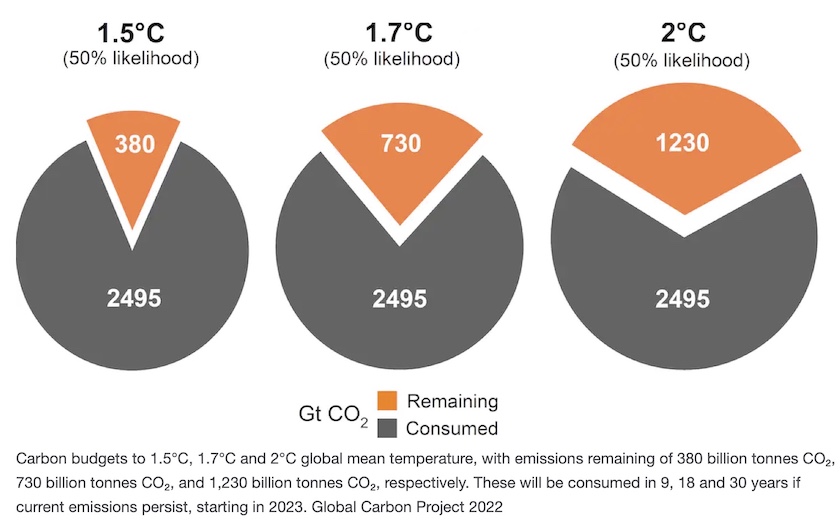Reports from COP27 – an overstressed planet
The hard numbers
An impressive group of researchers from many countries has presented a challenging set of hard numbers on emissions: Global carbon emissions at record levels with no signs of shrinking, new data shows. Humanity has a monumental task ahead, published in The Conversation.
It’s an update of earlier calculations, now incorporating the rise in emissions as countries’ economies have recovered from the pandemic-induced restrictions, and the changed sources of emissions as Russia has cut gas supplies to western Europe. Also they include the effects of China’s continuing Covid-19 lockdowns, which have caused a slight blip in its rapidly-growing emissions. Emissions from the EU and the USA, however, are trending downwards
Most striking is a simple graphic, copied from their article, which shows how much of our carbon dioxide budget we have spent if we are to reach various temperature change goals.

Public opinion on COP27: we believe it was worthwhile
The latest Essential Report has a question “Do you think the outcomes of the COP27 can make a meaningful difference on climate change?”
Just on 50 percent of respondents believe the parties to COP27 can make a meaningful change. Younger people are particularly optimistic (67 percent agree that they can).
The question is open-ended. A tougher question would have been “Do you think they can keep warming to less than two degrees?”, but that would require more knowledge of the basic figures than most people have.
Our crowded and ageing planet
If you are now 45 years old, the world’s population has doubled over your lifetime.
Last week the planet reached a population of 8 billion. It is projected to go on growing for the next 40 or 50 years, before it starts falling. Demographers can be reasonably assured that it will peak, because, “we’ve already hit peak child – there will never again be more children alive than there are today, with fertility rates plummeting across the globe”, as the ABC points out on an infographic prepared by Casey Briggs – 8 billion and counting.
Many European countries, Russia, China and Japan are already on the pathway to lower populations by 2050. India and most of Africa will continue to grow for some time yet, however.
It’s hard to grasp the rapidity of the world’s population growth. In 1800 the world population was just 1.0 billion, in 1900 it was 1.6 billion. The spectacular growth has been a twentieth-century phenomenon, leading belatedly to an understanding of our planet’s natural resource limitations, including the capacity of the atmosphere to absorb greenhouse gas emissions.
Is overpopulation a problem? Yes it is, but writing in The Conversation a group of academics stress that pressure on the planet’s resources stems from the consumption patterns of rich people, not from the much more modest demands of the still-expanding numbers of very poor people: You are now one of 8 billion humans alive today. Let’s talk overpopulation – and why low income countries aren’t the issue.
This statement echoes the call from the United Nations: As the world’s population hits 8 billion people, UN calls for solidarity in advancing sustainable development for all. The sustainable development goals are broader than climate change alone, but the same message is conveyed: the poor of the world suffer from environmental degradation, while they make the least contribution to it. The UN has specifically called for rapid decoupling from fossil fuels as global population hits 8 billion people.